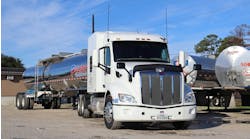With the price of diesel on the rise and tank truck carriers trying to maintain a qualified driver force, the use of electronic data collection solutions is becoming essential to compete in a tight economy.
Kenneth Manning of Transportation Costing Group Inc (TCGI) pointed out that just collecting the information is ineffective if it is not properly analyzed.
Manning, whose company specializes in activity-based profitability and cost analysis for the transportation industry, discussed the subject at the National Tank Truck Carriers annual conference May 18-20 in New York City.
He pointed out that not only are electronic programs more convenient for drivers to use, they also are more accurate. The advantages play well for driver job satisfaction while at the same time providing important data, such as fuel-related information.
Manning said today's carrier operations, in order to operate efficiently, require pricing sophistication, the ability to optimize yield, and analysis and management of profitability. It is vital to analyze volume trends and rates.
He added that the analysis should take into consideration current trends as well as projections for the future. With the data in hand, carriers can focus on both profitable and non-profitable segments.
He suggested carriers analyze by:
-
Lanes to determine profit and losses.
-
Individual customers. “Analyze by customers that give you the most and least amount of revenue,” he said.
-
Individual sales employee profitability. “Look at the customer detail that sales representatives are responsible for,” he added.
-
Commodities.
-
Tank cleaning, including in-house services.
-
Driver and trailer pool profits.
-
New customers to determine if they meet original projections.
-
Driver costs.
-
Back hauls for productivity.
-
Driving times to determine if they can be reduced.
-
Driver history, such as age, commercial driver license information, and violations.
“If you don't know the specifics, you are going to be pricing on averages,” he said, adding, “But you want better than average results. It's very important to avoid averages…You can't manage what you don't measure.”
At the same time, he pointed out that an overall perspective regarding data analysis should be kept in place, including its relevance, applicability, and controllability. The goal is to reduce activities that aren't helping profitability.
“Activities have a trend to them and that is something you need to manage,” Manning said. “Often, the truth is counterintuitive to what you expected.”








